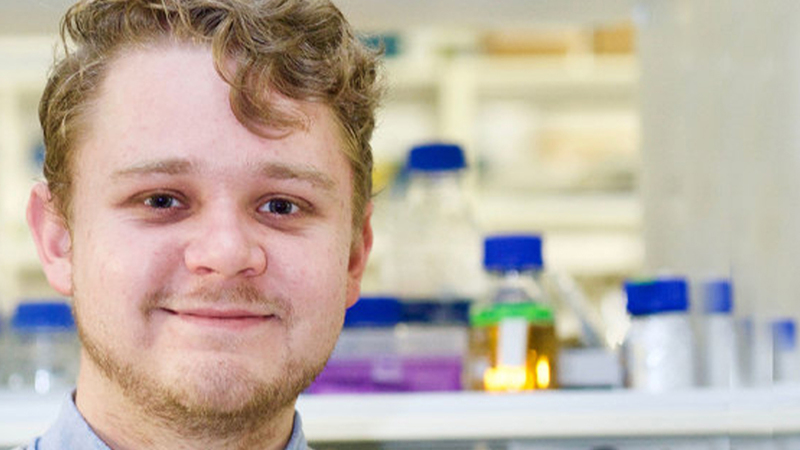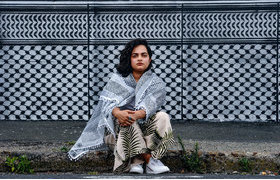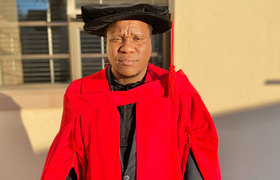A decade of studying earns a UCT medical student a PhD before his medical degree
10 December 2021 | Story Wendyl Martin. Video Edit Ryno Productions. Photo Supplied. Read time >10 min.Trailblazing his own path, choosing not to follow the crowd and being brave has brought University of Cape Town (UCT) medical student Timothy de Wet benchmark-setting academic achievement: he will graduate with a PhD this December, and is set to graduate with an MBChB in December 2022.
De Wet’s TB-related research has earned him his PhD; and after his MBChB graduation next year, he will set out on the path of being a trained clinician-scientist.
This 10-year journey was made possible through an intercalated programme known as the UCT Clinician-Scientist Training Programme (UCTCSTP), an opportunity De Wet took up after his third year of medical school.
An article published in the South African Medical Journal in 2019 explains the programme as follows:
“[It] offers academically high-performing students an extra course in molecular medicine during the third year of the MBChB degree. The molecular medicine course is required for MBChB students to meet the Higher Education Qualification Sub-Framework (HEQS-F) level and prescribed credit for admission to the BMedSci Hons programme, which they undertake as a ‘year out’ from the MBChB programme between years three and four. After completing the honours year, students have the opportunity to extend postgraduate scientific training in the form of either an MSc or a PhD degree, completed before, after or concurrently with years four to six of undergraduate medical training.”
“He will be the very first student who will graduate with both a PhD degree and an MBChB degree.”
De Wet has completed his studies in this programme in a minimal amount of time: his honours degree in biochemistry is complete, his PhD in medical microbiology will be conferred soon, and next year is his medical school graduation. He worked towards these achievements while maintaining a work-life balance by working hard when necessary, interspersed with adequate relaxing time.
At the Wolfson Memorial Lecture on 22 November 2021, Professor Valerie Mizrahi, the director of the Institute of Infectious Disease and Molecular Medicine (IDM), acknowledged De Wet’s academic achievements ahead of him receiving his PhD.
“He will be the very first student who will graduate with both a PhD degree and an MBChB degree through Professor Arieh Katz’s brainchild – the [UCTCSTP] programme that our late dean, Professor Bongani Mayosi, implemented. It was his vision to create this intercalated programme.
“[Timothy] asked questions using powerful genetic tools. What happens to the shape of a close relative of the TB bacillus if you put it under stress?
“The normal shape of these bugs is that they are long rods. What Tim has done together with Professor Digby Warner is to develop and help to train a new generation of brilliant young PhD students who have created an atlas, of which are now being used as a tool for elucidating drug mechanisms of action in TB,” said Professor Mizrahi.
Reflections on a decade-long academic path
Now at the end of his ninth year in a 10-year academic programme, De Wet is taking some well-deserved time off to relax and reflect before his final stretch in 2022.
He submitted his PhD thesis in March 2021 and returned to medical school.
“I am pretty tired, to be honest – I don’t want to do another degree for a while,” joked De Wet.
“The intercalated programme allows medical students, after three years, to take a year out and do an honours degree. [After that] I started with the PhD, first as a master’s in 2017 that was later upgraded to a PhD in 2018. Most people take four years or so to do a PhD, and so I suppose I did it in [the] minimal amount of time possible,” he explained.
The inkling that would result in De Wet taking this decade-long path began as early as high school.
“I knew even out of high school that this intercalated programme existed, so part of the reason I chose UCT medicine was because of the possibility of taking that time out. That was partially because I wanted a broader education. When I was in third year, in order to get into the honours programme, we had to do extra course work. I attended a lecture by Professor Digby Warner, and he talked about bacteria, and I found that really exciting.”
“I enjoyed being in the lab, and the problem-solving aspect of that.”
After this, De Wet contacted Warner and said he would like to do an honours degree with him; and asked if Warner had any projects available.
In his honours project, De Wet tried to create a bacterial sensor of Vitamin B12 concentrations. The idea was that he would engineer a bacterium so that it would glow, depending on how much Vitamin B12 was in the environment. The project was unsuccessful, but he was able to pass with a distinction.
“I enjoyed my honours year a lot. My project didn’t work at all – I enjoyed being in the lab, and the problem-solving aspect of that. And it felt to me at the time that it would be a natural fit for me to stay on and to start with the master’s or PhD. I also knew at the time that there was opportunity for funding for the PhD through the programme.”
For his PhD thesis, titled “CRISPRi-based High-throughput Functional Genomic Approaches for use in Mycobacteria”, he worked on bacteria that cause TB.
“I used a model mycobacterium that’s closely related to TB. I developed some genetic approaches using a biological tool called CRISPR (clustered regularly interspaced short palindromic repeats), which does gene editing. I created a number of high-throughput genetic approaches to studying these bacteria. I would develop experimental bacterial strains and cultures, and often use next-generation sequencing, imaging or microscopy to extract quantitative data sets. My work was focused on creating bacterial strains and methods, doing computational work and analysing that data.”
Choosing his own path
What stood out about this lengthy academic path were the effects of leaving the crowd and going at it alone. Choosing this route left him without the camaraderie of a large medical school class. However, he doesn’t regret taking his own journey with the intercalated programme – and it has rewarded him with the broader clinician-scientist training he desired.
“Studying medicine is a very linear path. You start with a class of about 200 people, and then you spend six years together, and then you all graduate together, and then you all go on to an internship and then community service. You have a nice cohort in that way ... I lost that cohort. There was no longer a large group of people [who] were with me. That was challenging; you see the friends you made graduate and move on and get jobs.
“I learnt that you have to make your own path and be comfortable with taking a diverted route.”
“I learnt that you have to make your own path and be comfortable with taking a diverted route. I learnt the importance of being patient and making your own path rather than going with the large group; because it is scary.”
Maintaining a work-life balance was key to completing his studies and his academic successes.
“I don’t think I always worked very long hours. My philosophy is that I try to, quite intensely, for even short periods of time or when the work needs to be done; and then when I am not working, I relax, and I try to not feel guilty.
“Sometimes I think my hobby outside of medicine is research. Other than that, I enjoy cooking, eating with people, reading; and before COVID-19, I enjoyed going out to the theatre and movies.”
Support from faculty staff
With this much time spent at the Faculty of Health Sciences, De Wet has seen much change; yet he finds it a supportive place.
“#FeesMustFall happened; the former dean, Professor Bongani Mayosi, passed away; COVID-19 has happened. It’s been quite a dramatic period to be in the faculty. I feel like an integrated part. I have played many roles as well: I have been a student, I have tutored, I’ve been in research positions, and now I’m back as an undergraduate student.”
He highlights his supervisors – Professors Digby Warner, Musa Mhlanga and Valerie Mizrahi – as being particularly supportive.
“You have to be comfortable with enjoying the journey. If you try to rush it, it doesn’t really work.”
“I think it can be a very supportive place, particularly at the postgraduate level ... There are world-class researchers, it’s a centre of HIV and TB research. I have built up good networks within the faculty and with international collaborators, and that has all been enabled by the faculty.”
With the journey almost complete, the door is wide open for De Wet to show the world what he is capable of as a trained clinician-scientist. It looks like his will to research has not burnt out yet.
“I intend to finish the medical degree next year, and then I probably will do [an] internship and then aim to qualify clinically, and then get my ability to practice. In the next five- to 10-year span I would like to head back into research. My long-term ambition is to end up in academia, or a biotech or industry space.
“With clinical exposure and perspective, I’d like to head back into fundamental research.”
His advises students taking similar courses not to rush.
“Medical or academic training is a really long route. You have to be comfortable with enjoying the journey. If you try to rush it, it doesn’t really work.”
 This work is licensed under a Creative Commons Attribution-NoDerivatives 4.0 International License.
This work is licensed under a Creative Commons Attribution-NoDerivatives 4.0 International License.
Please view the republishing articles page for more information.











